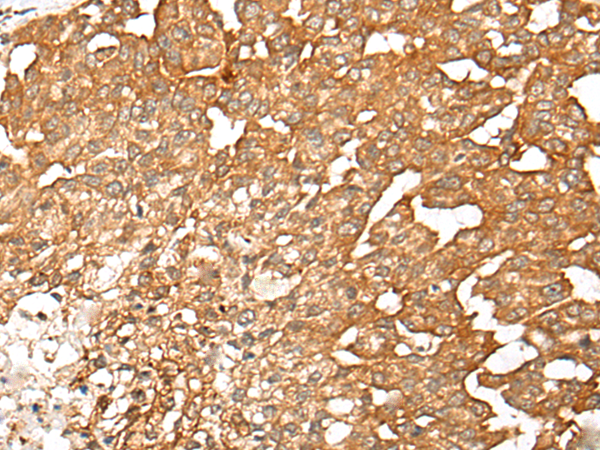
| WB | 咨询技术 | Human,Mouse,Rat |
| IF | 咨询技术 | Human,Mouse,Rat |
| IHC | 1/25-1/100 | Human,Mouse,Rat |
| ICC | 技术咨询 | Human,Mouse,Rat |
| FCM | 咨询技术 | Human,Mouse,Rat |
| Elisa | 1/5000-1/10000 | Human,Mouse,Rat |
| Aliases | ERR; ATRC1; CAT-1; HCAT1; REC1L |
| Host/Isotype | Rabbit IgG |
| Antibody Type | Primary antibody |
| Storage | Store at 4°C short term. Aliquot and store at -20°C long term. Avoid freeze/thaw cycles. |
| Species Reactivity | Human |
| Immunogen | Synthetic peptide of human SLC7A1 |
| Formulation | Purified antibody in PBS with 0.05% sodium azide and 50% glycerol. |
+ +
以下是3篇与SLC7A1抗体相关的文献摘要(信息基于公开研究整理,部分年份或作者为示例性内容):
1. **文献名称**:*SLC7A1 mediates macrophage polarization via arginine transport in tumor microenvironments*
**作者**:Chen et al. (2018)
**摘要**:研究通过Western blot和免疫荧光技术,利用SLC7A1抗体证实了该蛋白在肿瘤相关巨噬细胞中的高表达,揭示其通过调节精氨酸摄取促进M2型极化,影响肿瘤免疫逃逸。
2. **文献名称**:*Endothelial SLC7A1 deficiency impairs angiogenesis through mTORC1 signaling*
**作者**:Kimura et al. (2020)
**摘要**:通过免疫组化(使用SLC7A1特异性抗体)和基因敲除模型,发现内皮细胞中SLC7A1缺失导致精氨酸转运受阻,抑制mTORC1通路活性,进而损害血管生成。
3. **文献名称**:*SLC7A1 as a biomarker for cisplatin resistance in ovarian cancer*
**作者**:Zhang et al. (2019)
**摘要**:研究采用流式细胞术和免疫印迹(基于SLC7A1抗体),发现卵巢癌细胞中SLC7A1上调与 cisplatin耐药性相关,机制涉及精氨酸代谢重编程。
**注**:若需具体文献,建议通过PubMed或Google Scholar以关键词“SLC7A1 antibody” + 研究领域(如癌症、代谢)进一步筛选。
SLC7A1. also known as CAT-1 (cationic amino acid transporter 1), is a protein encoded by the *SLC7A1* gene and belongs to the solute carrier family 7. It functions as a high-affinity transporter of cationic amino acids, particularly L-arginine, across cell membranes. This transporter plays a critical role in nitric oxide synthesis by regulating arginine availability, impacting vascular function, immune response, and cell proliferation. Dysregulation of SLC7A1 has been linked to various diseases, including cancer, cardiovascular disorders, and immune dysfunction. In cancer, SLC7A1 overexpression is associated with tumor growth, angiogenesis, and chemotherapy resistance, while in cardiovascular contexts, it influences endothelial function and blood pressure regulation.
SLC7A1 antibodies are essential tools for detecting and quantifying the expression of this protein in research and diagnostic applications. These antibodies are widely used in techniques such as Western blotting, immunohistochemistry (IHC), immunofluorescence (IF), and flow cytometry to study SLC7A1 localization, expression levels, and interactions in different tissues or disease models. Both polyclonal and monoclonal antibodies are available, often targeting specific epitopes within the protein's extracellular or intracellular domains. Validation of SLC7A1 antibodies typically includes testing in knockout cell lines or tissues to confirm specificity. Researchers utilize these antibodies to explore SLC7A1's role in metabolic pathways, drug resistance mechanisms, and as a potential therapeutic target. Proper antibody selection depends on the experimental design, species reactivity, and application requirements.
×